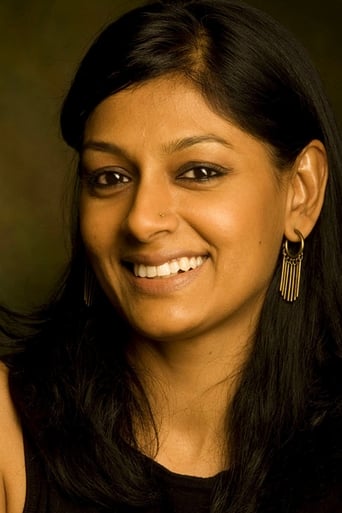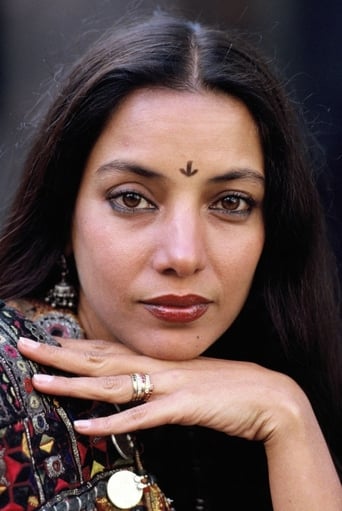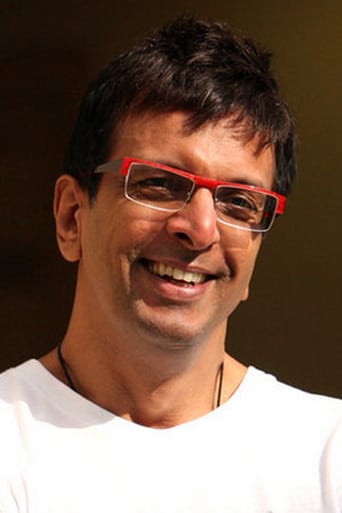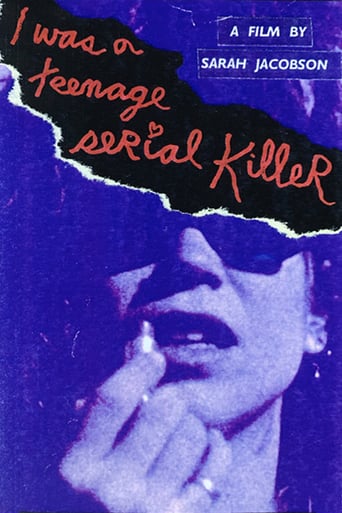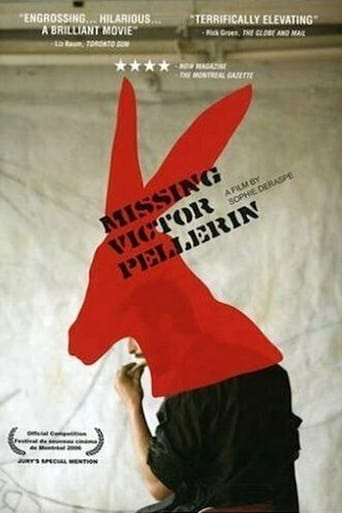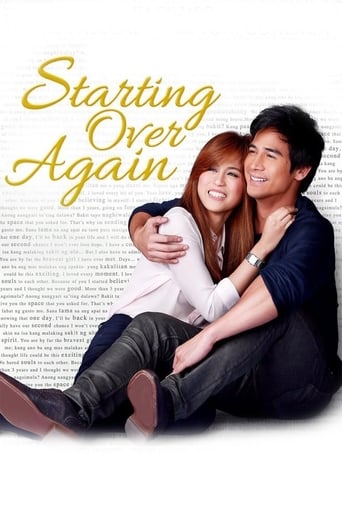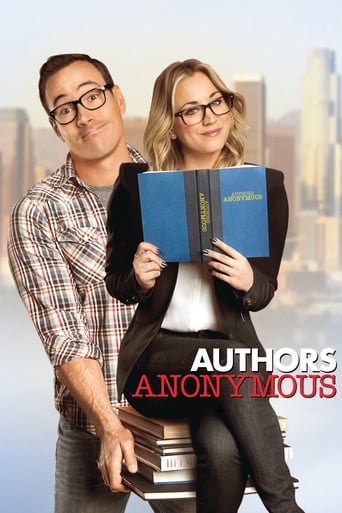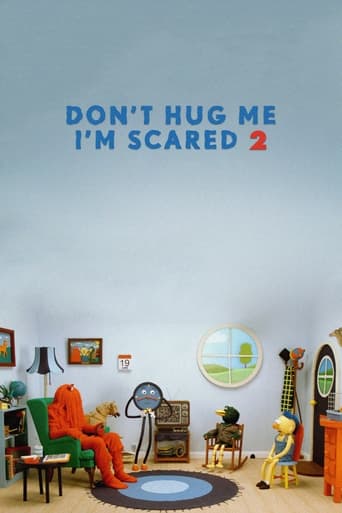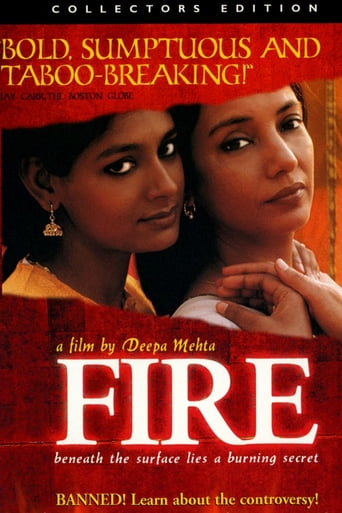
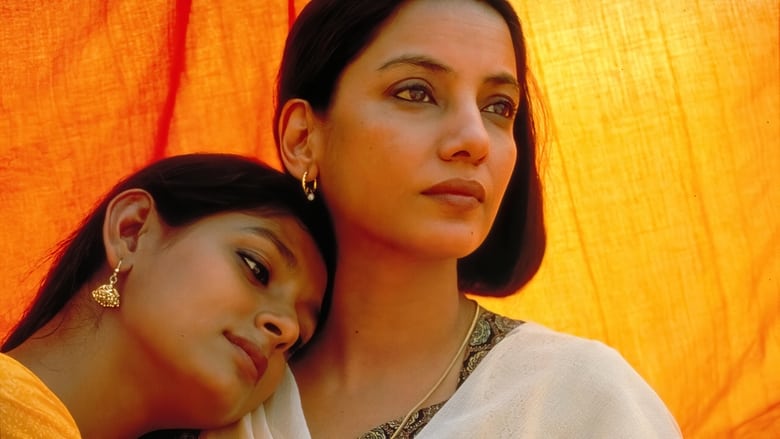
Fire (1997)
In a barren, arranged marriage to an amateur swami who seeks enlightenment through celibacy, Radha's life takes an irresistible turn when her beautiful young sister-in-law seeks to free herself from the confines of her own loveless marriage.
Watch Trailer
Cast
Similar titles
Reviews
Too much of everything
Sorry, this movie sucks
Pretty Good
The film never slows down or bores, plunging from one harrowing sequence to the next.
Congratulations to the makers of Fire, specially Deepa Mehta and Giles Nuttgens – they have succeeded in entertaining us. Fire is a wonderful film and is a landmark in the Indian History of Cinema. 1996 is the time when we were used to watching blockbusters with not much story, Hum Aapke Hain Kaun (1994) et al. It was the time when the song 'Sexy Sexy' from Khuddar (1994) was censored to 'Baby Baby' (it sounds funny now though). It was also the time when people enjoyed family dramas or even violent drama films, Ghatak (1996) for instance. To make such a movie in India in that period was a courageous effort from the complete crew of Fire.Story is nothing new to talk of; everybody knows it – two women (Shabana Azmi and Nandita Das), ignored by husbands, come together, find solace. Cinematography by Giles Nuttgens is fabulous. There is not much space in the set of the house to move the camera around (and that is evident in the film as Mehta wanted to make the set look real) but still, Nuttgens manages to give some wonderful cinematography. Observe the movements in the beginning of the film, in the huge field and later in Taj Mahal – that itself proves his abilities. There is a dusky brown tint throughout and many sequences are shot in a single go. He has planned the movement very well.Shabana Azmi as Radha is superb in the film. She is remarkable towards the final sequences where she is confused whether she is doing the right thing or not. Her outburst with Khulbhushan Kharbanda (who plays Ashok) is the highlight of the film, which is accompanied by wonderful background music by A. R. Rahman. Khulbhushan has got nothing to do throughout except in the end and he utilizes the opportunity well. I was surprised to see Javed Jafferi as Jatin in the movie. I never knew this famous comedian-dancer has acted in this masterpiece. He proves that not only is he good at comedy and dance, but also at acting.I was a bit perplexed to see Ranjit Chowdhary as Mundu masturbating. I wondered long why Mehta has induced this into the film, why not any other mischief by him, and this is answered towards the end and becomes the root cause of Radha's confusion. Every scene in the film has some meaning, be it Jatin's humiliation by his Chinese girlfriend Julie's parents, or the continual use of the scene from Ramayan where Sita plunges into the pyre to prove her purity, or even Radha's dream sequence. Amidst the fast paced drama, we get some relief in the form of 'Mundu's Fantasy.' For example, he imagines the story Radha narrates in the movie in which he is the king, Radha his wife, Sita (played by Nandita Das) his mistress and Jatin his servant. Also, the sex scene in the end is aesthetically filmed and doesn't go above what was required.Such a film can never be imagined to come out of India, even today, 15 years after its release. It is only now that we are witnessing gay characters in Hindi Movies – Dostana (2008), I Am (2011) – implied masturbation – Ek Chotisi Love Story (2002) – but not as explicit as in this film. Not only from the theme and content point of view, also from the presentation point of view, the film is different. The scenes are moving along with the camera and the drama develops at a fast pace and maintains the speed throughout. Some jokes drop by but the story is continuously moving within the small house. The dialogs of the film are witty and at times humorous (e.g. Sita – Are you coming home tonight? Jatin – Maybe! ; Radha – Where is Jatin? Sita – He is away to meet his girlfriend). You cherish them and at the same time get involved in them and feel the character's pain. The production design is completely different from other films then.A marvelous effort by Deepa Mehta (though didn't gain recognition in India due to the explicit homosexuality in the film) and the rest of the crew. Kudos to them. And I must appreciate the censor board of India that they released this film without any cuts and an A certificate.
Bold, controversial and taboo-breaking are among the many attention-grabbing words that have been used to describe 'Fire' and this has no doubt helped the film gain recognition. However, I feel that such adjectives undermine the true beauty of that is depicted in this picture. It deals with many themes such as feminism, affection, love and freedom and at the heart of the film lies the relationship between Seeta and Radha. The bond between them is portrayed with such innocence, tenderness, affection and sensibility that its beauty stands out. The growth in the two characters and the development of their relationship is splendid to watch. While the relationship is portrayed with sensuality, there is no titillation or overt skin exposure.Due to the theme of homosexuality and the questioning of religion, 'Fire' was ridiculously banned in several countries. It is never specified whether Seeta or Radha were exclusively homosexual. They're never shown to not enjoy a sexual relationship with their respective male partners. Radha has made numerous attempts over the years to have that kind of intimacy with her celibate husband but he's the one who refuses while in Seeta's case, sex is a mechanical thing for her husband. What they Seeta and Radha find in each other is affection, love, desire and tenderness, something they yearned for but never had with their husbands.Many have argued that Deepa Mehta deliberately uses shock value and portrays India as repressed in order to make her film appeal to the Western audience. I don't know whether that was her intention with 'Fire' but to me it felt like an honest movie and the problems portrayed in this film are still very much a reality in India. I would even go as far to say that this is among Mehta's best works. Her use of metaphors is brave and gives the film a poetic feel.Mehta's films have often scored high in the technical department and 'Fire' is no different. Here the cinematography and A.R. Rahman's score particularly stand out. The music is mesmerizing. The art direction too is brilliant.Luminous Nandita Das is terrific as the young, vivacious and energetic Seeta. Shabana Azmi is once again transcendent. Her nuanced, quiet and restrained performance easily touch on the heartstrings. Kulbhushan Kharbanda and Javed Jaffrey provide good support.Forget all the labelling, controversial or not 'Fire' is worth seeing for the beauty it portrays when two people find love and freedom in each other.
This film shows what the next generation is all about. You should always follow your heart and mind and not the views and expectations of society.Society these days means that you should act and behave in a certain manner. Anything outside this is seen as shameful and a disgrace. This film shows that happiness is not always found by doing what other people expect of you...its about doing whats right for your self.The film shed a light to the film industry and films like this need to be promoted more due to its reality and what younger people have to endure and o through.i don't have a problem with homosexuals....if thats the way they choose to live there life then so be it. It is there choice.As long as no-one of the same sex as myself tries to hit on me, because i am alllll straight, (hetero).Good film.
A fairly interesting look at some characters from India's burgeoning middle class. Although India is rapidly modernizing, her culture is not keeping up. This film involves the patriarchal society, where women are not yet truly free citizens. A land of arranged marriages, men who dally with mistresses with total impunity, and women who are expected to tolerate all this, will eventually come up short. I was impressed with Nandita Das, who was quite attractive, and played her character with total earnestness. But I was even more impressed with Shabana Azmi, who I understand is a long-time fixture of Bollywood. Her quiet beauty and low-key psychic suffering was excellent. The lesbian subtext of this film was never particularly erotic, and never titillating. (Darn!) Worth a look for those interested in vastly different cultures.
